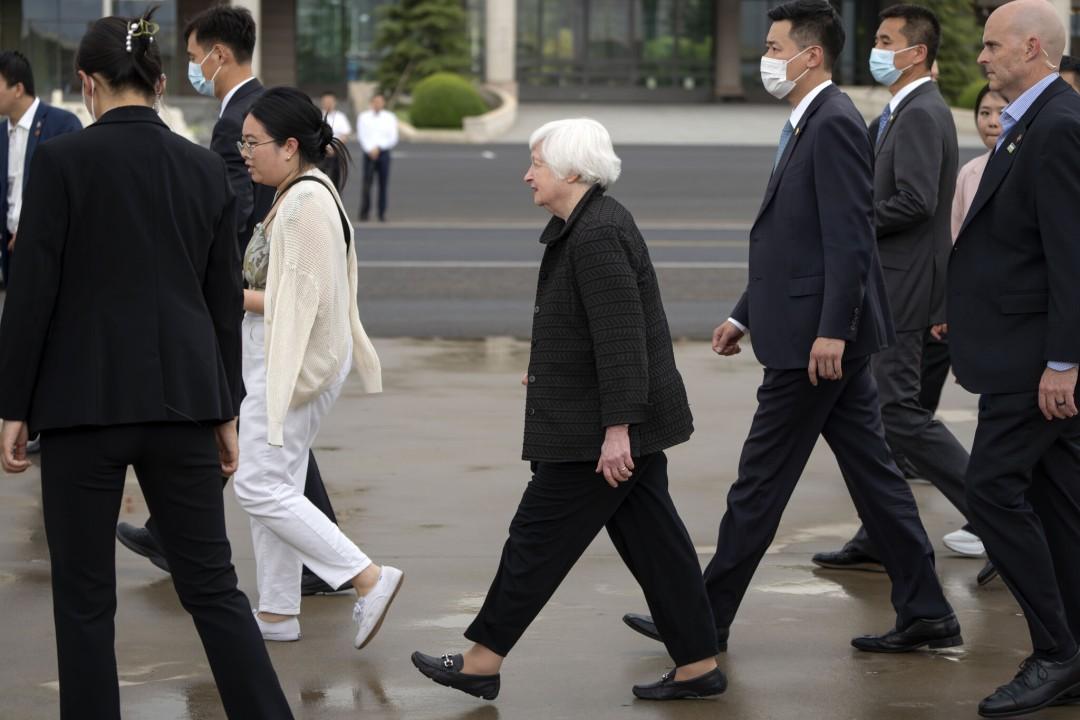“People like me grew up with the view: If people send you cheap goods, you should send a thank-you note,” said Janet Yellen, America’s nerdy white-haired assassin. “That’s what standard economics basically says,” continued the Treasury Secretary, presumably referring to something she learned in Econ 101 at Brown University in the late 1960s. “I would never ever again say: send a thank-you note.” Back when Janet shuffled between classes in Providence, our impoverished trading partners slaved away to build us cheap televisions thank you very much. Having tamed three former foes through free market capitalism, in the late 1990s Yellen and her fellow economists shifted their focus from Germany, Japan, and the former USSR to China. Bill Clinton named her his Chair of Economic Advisors in 1997 and in 2001 China was admitted to the WTO. It has since grown GDP by something like 1,200% and lifted more people out of abject poverty than any nation in history. A remarkable achievement for humanity. For years, we thanked Beijing for cheap flatscreens and recycled dollar reserves. “China is too large to export its way to rapid growth. And if policies are oriented only at generating supply and not also at generating demand, global spillovers will result,” warned Yellen, focused ostensibly on green energy exports like solar panels, lithium batteries, and EV autos. If ever in world history there were a category of cheap goods that standard economists would be grateful to receive it would be mass-produced products that help reduce carbon emissions. But our competition with China is no longer about economics and Yellen is no longer an economist. It’s about politics and she is a politician. China has built enough hypersonic anti-ship missiles and exported a sufficient volume of cheap fentanyl and TikTok propaganda for America to deliver a different kind of thank-you note. The US now cares more about stranding China’s vast productive capacity (and denying it cutting edge technologies) than almost anything else. In an election year, it is Washington’s only real issue with bipartisan agreement.
Week-in-Review: Mon: UK holiday, Erdogan’s AKP party suffers losses in Municipal elections / Erdogan acknowledges defeat and vows to improve, Trump’s media company (now listed as DJT) reports material losses, Israeli airstrike on Iranian embassy in Syria killed top military commander – increasing risk of escalation, S. Korea Expts 3.1% (4.2%e) / Impts -12.3% (-10.9%e), Indonesia CPI 3.05% (2.91%e) / Core 1.77% (1.71%e), US ISM mfg 50.3 (48.3e) / Prices paid 55.8 (53.0e), S&P -0.2%; Tue: Trump posts 175m bond, Iran vows revenge following Israeli air strike, RBA mins confirm neutral stance, TSLA dropped after 1Q deliveries massively undershot, Biden/Xi speak for first time since Nov / Biden raised concerns over trade policies and Russian support / Xi said China wants good ties with US but won’t tolerate Taiwan independence, Fed’s Daly believes 3 cuts is still a reasonable expectation for 2024 / Fed’s Mester wants to see more disinflation before cutting, Israel ‘accidently’ killed seven aid workers via airstrike in Gaza, Chile CB cuts 75bp as exp, South Korea CPI 3.1% (3.0%e), UK Nationwide house Px 1.6% (2.4%e), EU final PMI mfg 46.1 (45.7e), UK final PMI mfg 50.3 (49.9e), Germany CPI 2.2% as exp, US JOLTS jobs openings 8.756m (8.730m exp) / Quits 3.484m (3.446m prev), US Factory orders 1.4% MoM (1.0%e) / Durable goods orders 1.3% MoM (1.4%e), S&P -0.7%; Wed: Powell emphasizes patience but highlights Supply-side recovery and benefits of a tight economy – creating a dovish tone amid recent strong data, ECB’s de Cos central scenario is a June cut, Biden rebukes Israel for not doing enough to protect civilians and aid workers in Gaza, Yellen says US won’t let China overwhelm American industry ever again, Turkey CPI 68.50 (69.10%e) / Core Index 75.21% (75.19%e), EU CPI 2.4% (2.5%e) / Core 2.9% (3.0%e), EU Unemp rate 6.5% (6.4%e), US Mortgage applications 6.5% (6.4%e), Brazil IP 5.0% (5.7%e), US ADP Emp change 184k (150k e), Russia Ret sales real 12.3% (9.3%e), US serv PMI (final) 51.7 as exp / composite 52.1 (52.2p), US ISM serv 51.4 (52.8e) / prices paid 53.4 (58.4e), S&P +0.1%; Thu: Israel braced for potential Iranian attack by scrambling navigational signals over Tel Aviv / Israel says cease-fire talks are stalling – Oil breaches $90/barrel, Gold trades above 2300 for first time ever driven by the dovish Powell rhetoric, Poland CB unch as exp, Fed’ Kashkari says chance of no cuts in 2024 if inflation stalls / Harker says inflation still too high, BOJ’s Ueda says could hike if yen declines affect inflation, ECB mins suggest the time for rate cuts is near, Russia Unemp rate 2.8% (2.9%e), EU PMI (final) serv 51.5 (51.1e) / comp 50.3 (49.9e), EU PPI -8.3% (-8.6%e), US Trade balance -$68.9b (-$67.6b e), US Initial jobless claims 221k (214k e), S&P -1.2%; Fri: US NFP 303k (214k exp) / unemp 3.8% as exp / AHE 4.1% as exp, BOJ’s Ueda hints that the next rate hike will come in 2H, Yellen chided China to return to pro-market reforms during visit to China, Argentina’s Milei said he won’t touch existing trade deals with China, India CB unch as exp / hawkish tone as concerns over coming heatwave causing inflation was voiced, Biden warns Netanyahu that US support hinges on civilian safety, Fed’s Logan says too soon to consider cutting, Japan Household spending -0.5% (-2.9%e), Japan leading index 111.8 (111.6e), Germany factory orders -10.6% (-10.1%e), EU Ret sales -0.7% (-0.8%e), Canada Net change in emp -2.2k (25k e) / Unemp rate 6.1% (5.9%e), Russia GDP 4.9% (5.3%e), S&P +1.1%; Sat: Navy men’s lacrosse beat Lafayette 10-9.
Manufacturing PMI (high-to-low): India 59.1 (previous month 56.9), Greece 56.9 (previous month 55.7), Russia 55.7 (previous 54.7), Indonesia 54.2/52.7, Brazil 53.6/54.1, Hungary 52.3/52.3, Mexico 52.2/52.3, Spain 51.4/51.5, China 51.1/50.9, Hong Kong 50.9/49.7, Norway 50.8/52, Singapore 50.7/50.6, Italy 50.4/48.7, United States 50.3/47.8, UK 50.3/47.5, Sweden 50/49.2, Turkey 50/50.2, Vietnam 49.9/50.4, Canada 49.8/49.7, South Korea 49.8/50.7, Netherlands 49.7/49.3, Taiwan 49.3/48.6, South Africa 48.4/50.8, Japan 48.2/47.2, Poland 48/47.9, Czech Republic 46.2/44.3, France 46.2/47.1, Switzerland 45.2/44, Austria 42.2/43, Germany 41.9/42.5; Services PMI: India 61.2/60.6, Ireland 56.6/54.4, Spain 56.1/54.7, Brazil 54.8/54.6, Italy 54.6/52.2, Australia 54.4/53.1, Japan 54.1/52.9, Sweden 53.9/51.2, UK 53.1/53.8, China 52.7/52.5, US 51.7/52.3, Russia 51.4/51.1, Germany 50.1/48.3, France 48.3/48.4.
Weekly Close: S&P 500 -1.0% and VIX +3.02 at +16.03. Nikkei -3.4%, Shanghai +0.9%, Euro Stoxx -1.2%, Bovespa -1.0%, MSCI World -1.5%, and MSCI Emerging +0.5%. USD rose +6.5% vs Ethereum, +2.6% vs Bitcoin, +1.0% vs Brazil, +0.4% vs Canada, +0.2% vs Yen, and +0.1% vs China. USD fell -3.1% vs Chile, -1.0% vs Turkey, -0.9% vs South Africa, -0.9% vs Australia, -0.6% vs Mexico, -0.4% vs Euro, -0.2% vs Sweden, -0.1% vs Russia, -0.1% vs India, -0.1% vs Sterling, and -0.1% vs Indonesia. Gold +4.9%, Silver +10.7%, Oil +4.3%, Copper +5.9%, Iron Ore +6.1%, Corn -1.9%. 10yr Inflation Breakevens (EU +4bps at 2.10%, US +5bps at 2.37%, JP +10bps at 1.41%, and UK +7bps at 3.72%). 2yr Notes +13bps at 4.75% and 10yr Notes +20bps at 4.40%.
March Mthly Close: S&P 500 +3.1% and VIX -0.39 at +13.01. Nikkei +3.1%, Shanghai +0.9%, Euro Stoxx +3.7%, Bovespa -0.7%, MSCI World +3.0%, and MSCI Emerging +2.2%. USD rose +3.7% vs Turkey, +2.7% vs Sweden, +2.0% vs Russia, +1.3% vs Chile, +0.9% vs Yen, +0.9% vs Indonesia, +0.9% vs Brazil, +0.6% vs India, +0.5% vs China, +0.1% vs Euro, and flat vs Sterling. USD fell -9.7% vs Bitcoin, -2.9% vs Mexico, -1.7% vs South Africa, -1.3% vs Ethereum, -0.4% vs Australia, and -0.3% vs Canada. Gold +7.9%, Silver +8.9%, Oil +7.4%, Copper +4.2%, Iron Ore -18.5%, Corn +2.9%. 10yr Inflation Breakevens (EU +3bps at 2.06%, US flat at 2.32%, JP +4bps at 1.30%, and UK +5bps at 3.65%). 2yr Notes flat at 4.62% and 10yr Notes -5bps at 4.20%.
2024 Year-to-Date Close: Argentina +22.4% priced in US dollars (+30.6% priced in pesos), Turkey +18.9% priced in dollars (+28.8% priced in lira), Colombia +18.7% in dollars (+16.2% in pesos), Denmark +12.9% in dollars (+15.3% in krone), Ireland +12.4% (+14.7%), Italy +9.7% (+12.1%), Netherlands +9.6% (+11.9%), S&P 500 +9.1% in dollars, Euro Stoxx 50 +8.6% (+10.9%), Japan +8.3% (+16.5%), NASDAQ +8.2% in dollars, Taiwan +8.2% (+13.4%), MSCI World +6.9% in dollars, Germany +6.3% (+8.5%), Saudi Arabia +6.1% (+6.2%), Poland +6% (+6.6%), Russia +5.9% (+9.6%), Spain +5.8% (+8.1%), Hungary +5.6% (+9.7%), Greece +4.8% (+7%), France +4.7% (+6.9%), Mexico +4.1% (+1.2%), India +3.5% (+3.6%), Malaysia +3.4% (+6.9%), Canada +3.3% (+6.2%), Czech Republic +3.1% (+7.9%), Philippines +2.4% (+4.6%), Russell +1.8% (+1.8%), Austria +1.7% (+3.8%), China +1.3% (+3.2%), Belgium +1.3% (+3.4%), UK +1.3% (+2.3%), Israel +1% (+4.7%), Venezuela +0.7% (+2%), Norway -0.7% (+5.3%), Australia -1.4% (+2.4%), Sweden -1.4% (+4.5%), HK -2.1% (-1.9%), Chile -2.6% (+5.1%), Korea -2.7% (+2.2%), Singapore -2.8% (-0.7%), Indonesia -2.9% (+0.2%), New Zealand -3.2% (+2.1%), UAE -3.5% (-3.6%), Switzerland -3.9% (+3.2%), Finland -4% (-2%), South Africa -4.7% (-2.6%), Thailand -9.2% (-2.8%), Brazil -9.4% (-5.5%), Portugal -15.1% (-13.4%).
Zeitenwende: “Since Russia has called the European peace order into question, a special threat situation has arisen for Germany and its allies,” said German defense minister Pistorius this week, noting Germany would be considering the reintroduction of compulsory military service for its youth. Serbia and Croatia are considering the same. Latvia reintroduced a draft after Russia’s invasion. And NATO turned 75 this week. Secretary of State Blinken announced: “Ukraine will become a member of NATO. Our purpose at the summit is to help build a bridge to that membership.”
Zeitenwende II: “Germany is doing everything it can to defend and foster an international order based on the principles of the UN Charter,” wrote German Chancellor Olaf Scholz in Dec 2022 [here]. “Its democracy, security, and prosperity depend on binding power to common rules. That is why Germans are intent on becoming the guarantor of European security that our allies expect us to be, a bridge builder within the European Union and an advocate for multilateral solutions to global problems. This is the only way for Germany to successfully navigate the geopolitical rifts of our time.”
Zeitenwende III: The US warned Israel of a retaliatory attack by Iran using drones and cruise missiles. Biden announced that the US would halt plans to replenish America’s strategic petroleum reserve, which he depleted to dampen inflation back before the Middle East caught fire again. Oil ended the week +4.3% at new highs. US inflation firmed, extending a process of bottoming in the face of record low unemployment, record high equity prices, staggering budget deficits, and expectations the Fed will cut rates and end QT early. Gold rose +4.9% to a record.
Momentum: “Utilities tell you they have power. But they don’t,” said the entrepreneur, early to the data center investment theme, that has gone parabolic with AI. “I want 300 megawatts for this site, and they say fine. But cut through the details and you’ll get power in 2029 at the earliest,” he said. I was checking in. “Now we’re building generation capacity ourselves, we have to.” Natural gas generators. “We can get them up and running in 6-9mths. The permitting is the big issue. But we’re on it, it’s the only solution. $300mm power plants on 15 acres.”
Momentum II: “In 5-10 years, you won’t need this kind of power solution,” continued the entrepreneur. “Utilities will have it built by then. And who knows what we’ll need that far out,” he said, unconcerned, leveraging into the trade, the momentum so strongly in his favor. Wind at his back. “It’s possible that this new intelligence that is being born will figure out how to sustain itself using far less power. Let’s all hope so. But at any rate, it’s not a foregone conclusion that this will scale linearly.” And either way, that is a tomorrow trade, a new theme for another year.
Mental Models: “The internet was a platform,” said the CIO. “It took a long time to scale. You had to lay physical fiber to connect the world,” he continued, no stranger to that buildout, the winners, the losers. Firms like Global Crossing and WorldCom laid 90 million miles of fiber. Both filed for bankruptcy in 2002. Cisco was a darling too; it has yet to regain its high from 1999. “But AI is a tool that will enhance productivity and innovation. The pace of adoption and its impact will happen far faster than the internet, which is what most use as a mental model.”
Anecdote: “Came into the year with my team expecting 50 basis points of rate cuts and with the market pricing 125,” said Lone Star, a Top-5 best performing US endowment CIO. “Now the market has priced out 2-3 rate cuts, yet stocks have gone straight up, so something interesting is happening,” he said. “The equity market is sniffing out AI.” I had swung through Texas, taking the temperature. “Earnings calls have yet to attribute AI to expanding margins, bigger profits.” We’re on the dark side of the moon in terms of data for analysts to extrapolate. “We’re in a fulcrum year and in the future investors will look at everything that came before as pre-AI and everything after this year as post-AI,” said Lone Star, confident, convicted. “AI will expand profit margins by 2% over the next five years. Apply a 20x P/E to that and the S&P should be up 40%. If anything, that’s conservative,” he said. “We should see the S&P 500 at 7500 in 5yrs - up 7-9% per year on average.” But no market moves in a straight line. “If we get ahead of ourselves, and the S&P hits 5750 this year, I’m selling that strength.” But the key in investing is making sure you can ride out unexpected losses. Nothing good ever happens to you when you’re dead. You can’t even get lucky. “There are real risks out there, Israel and Iran could go hot at any moment.” That’s one of many flashpoints. “And there are massive leveraged players in this market. Multimanager funds are 20x leveraged. It doesn’t require a great imagination to envision them blowing up on some exogenous shock, they nearly did in 2008 and 2020.” Yet investors keep piling money into them, and with each new billion the risk of a disorderly unwind only grows – that’s how markets work. Even today’s AI models know that. “So we are not overleveraged. We can ride out the volatility, have some hedges, and have cash to deploy when others are forced to sell.”
Good luck out there,
Eric Peters
Chief Investment Officer
One River Asset Management
Disclaimer: All characters and events contained herein are entirely fictional. Even those things that appear based on real people and actual events are products of the author’s imagination. Any similarity is merely coincidental. The numbers are unreliable. The statistics too. Consequently, this message does not contain any investment recommendation, advice, or solicitation of any sort for any product, fund or service. The views expressed are strictly those of the author, even if often times they are not actually views held by the author, or directly contradict those views genuinely held by the author. And the views may certainly differ from those of any firm or person that the author may advise, converse with, or otherwise be associated with. Lastly, any inappropriate language, innuendo or dark humor contained herein is not specifically intended to offend the reader. And besides, nothing could possibly be more offensive than the real-life actions of the inept policy makers, corrupt elected leaders and short, paranoid dictators who infest our little planet. Yet we suffer their indignities every day. Oh yeah, past performance is not indicative of future returns.





